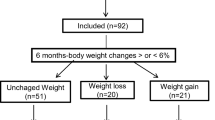Summary
Objective Advanced chronic heart failure is a hypercatabolic state with an imbalance between anabolic and catabolic metabolism and finally progressive loss of both muscle mass and adipose tissue. Leptin, the product of the obesity gene, is a hormone secreted by adipocytes. Therfore, we tested the hypothesis that plasma leptin concentrations are reduced in advanced chronic heart failure. Methods In 20 patients with chronic congestive heart failure (LVEF 23±6%) and 20 healthy controls (LVEF 65±8%) matched for gender, age, and body mass index, fasting plasma leptin (ELISA) and TNFα (ELISA) were measured. Follow-up examination was performed after 1 year. Results The fasting plasma leptin concentrations of patients with NYHA grade III (8.4±3.8 ng/ml*) and NYHA grade IV (4.6±2.4 ng/ml†) were significantly lower as compared with the controls (11.2±3.1 ng/ml; *p<0.05, †p<0.01). In patients with NYHA grade II plasma leptin levels were significantly elevated as compared with the healthy controls (14.9±4.2 ng/ml). TNFα was higher in heart failure patients than in healthy controls (8.6±3.6 pg/ml; 5.9±2.1 pg/ml; respectively; p<0.05), but did not correlate with the NYHA functional class. Mortality of the controls was 0%, whereas 15% (n=3) in the congestive heart failure group; one patient (5%) needs an urgent heart transplantation. All of those patients had leptin concentrations below 5 ng/ml. Conclusions Plasma leptin concentrations correlate with the NYHA functional class suggesting anabolic metabolism in NYHA class II and catabolic metabolism in advanced heart failure which might be of prognostic relevance.
Zusammenfassung
Hintergrund Die terminale Herzinsuffizienz ist ein hyperkataboler Status der durch ein Ungleichgewicht zwischen anabolem und katabolem Stoffwechsel gekennzeichnet ist und mit einem progredienten Verlust sowohl von Muskel- als auch Fettmasse einhergeht. Leptin, ist ein Hormon, das von dem obese-Gen kodiert und überwiegend von Adipozyten sezerniert wird. Wir stellten deshalb die Hypothese auf, dass die Plasmaleptinkonzentration bei der chronischen, fortgeschrittenen Herzinsuffizienz vermindert ist. Methoden 20 Patienten mit chronischer Herzinsuffizienz (LVEF 25±6%) wurden mit 20 Patienten ohne kardiovaskuläre Erkrankung (LVEF 65±8%) in einer „matched-pair” Analyse (Alter, Geschlecht und body mass index [BMI]) hinsichtlich ihrer Leptin- (ELISA) und TNFα- (ELISA) Plasmakonzentrationen untersucht. Eine Follow-up-Untersuchung erfolgte nach einem Jahr. Ergebnisse Die Leptinkonzentration von Patienten im NYHA-Stadium III (8,4±3,8 ng/ml*) und IV (4,6±2,4 ng/ml†) waren im Vergleich zu dem Kontrollkollektiv (11,2±3,1 pg/ml) signifikant erniedrigt (*p<0,05, †p<0,01). Patienten im NYHA-Stadium II (14,9±4,2 ng/ml) zeigten die höchsten Leptinspiegel. Die TNFα-Konzentrationen waren bei den herzinsuffizienten Patienten höher als bei dem herzgesunden Kontrollkollektiv (8,6±3,6 pg/ml vs. 5,9±2,1 pg/ml; p<0,05), korrelierten aber nicht mit dem NYHA-Stadium. Die Mortalität des Kontrollkollektives lag bei 0%, hingegen waren aus der Gruppe der herzinsuffizienten Patienten 15% (n=3) verstorben, ein Patient (5%) bedurfte einer dringlichen Herztransplantation. Alle vier Patienten zeigten Plasmaleptinspiegel unter 5 ng/ml. Schlussfolgerung Die Plasmaleptinkonzentration korreliert invers mit dem klinischen Stadium der Herzinsuffizienz und charakterisiert den anabolen Stoffwechsel im Frühstadium und den katabolen Stoffwechsel im Spätstadium der Herzinsuffizienz und besitzt möglicherweise prognostische Relevanz.
Similar content being viewed by others
Author information
Authors and Affiliations
Additional information
Eingegangen: 27. Juli 2000 Akzeptiert: 14. Dezember 2000
Rights and permissions
About this article
Cite this article
Richartz, B., Lotze, U., Krack, A. et al. Leptin: Ein Parameter für metabolische Veränderungen der Herzinsuffizienz. Z Kardiol 90, 280–285 (2001). https://doi.org/10.1007/s003920170174
Issue Date:
DOI: https://doi.org/10.1007/s003920170174




